Our Reporter, New York
The CEO of Njenje Media, Mazi Tochukwu Ezeoke, has lauded the judges of the Presidential Election Petition Court (PEPC) on how they have handled proceedings so far.
The journalist made the remarks during a guest appearance in the online interview programme 90Minutes Africa hosted by Rudolf Okonkwo on Sunday.
Mazi Ezeoke said that the Labour Party had been allowed to present its evidence before the PEPC without unnecessary objections from the lawyers of Bola Ahmed Tinubu, the APC, and other respondents.
“In many instances, they will raise objections for no obvious reasons. It gladdens that once they raise these objections, the court would say they overruled that objection. With the exception of one or two times that an objection was sustained, it has always been that their objections were stepped down and rejected, allowing the Labour Party to present their evidence,” he explained.
Peter Obi and the Labour Party are challenging the declaration of the candidate of the All Progressives Congress (APC) as the winner of the February 25 presidential election by the Independent National Electoral Commission (INEC). One of the main grounds of contention is that INEC violated its own electoral guidelines by failing to upload the polling units’ presidential election results to the IReV in real time as stipulated. INEC has said that their failure to upload the presidential election results was due to a “glitch” that affected the Commission’s server.
Mazi Ezeoke, however, explained that a Labour Party witness, a staff at Amazon Web Services that hosted the INEC Server, testified before the PEPC that there were no “glitches” at the company’s data centre during the election period.
Speaking further on the 18,088 blurred result sheets presented by the Labour Party to the PEPC, Mazi Ezeoke said that it translates to about 2.4 million votes without certainty on where they belong. He wondered why the “INEC chairman hurriedly declared” the APC candidate the election winner “with that level of non-clarity and intentional manipulation.”
Also responding to the recent statement of the spokesman of the electoral body, Mr. Festus Okoye that political parties should rely on the copies of result sheets received by their agents at the polling units rather raising issues over INEC’s inability to upload the results to IReV, the journalist questioned the rationale for INEC to come up with the idea of uploading results to IReV if they want the parties to simply rely on the copies of their polling unit agents.
“Before the election, INEC assured that the usage of BVAS and IReV is sacrosanct and must be adhered to. It is sad that the same INEC is now questioning the importance of the IReV. The question I will then ask is: don’t we know that we had agents before we talked about electronic transmission? So the statement of the INEC spokesman is nonsense. What INEC has not been able to satisfactorily explain to us until now is how come three elections were conducted in one day, and the results from two of them were successfully uploaded to the IReV, but the result of the third couldn’t be uploaded,” Mazi Ezeoke queried.

